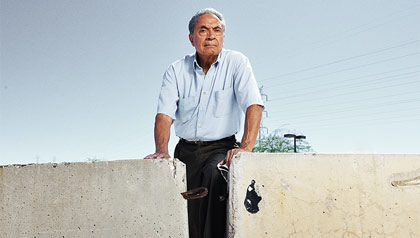Staying Fit


“I’ve never been reluctant about pushing doors open,” says Roberto Reveles, 79. After 24 years as a top congressional staffer for five lawmakers and 12 years as vice president for a gold mining company, he’s pushing harder than ever. Two years ago, in his so-called retirement, he became the American Civil Liberties Union of Arizona’s board president.
See also: The Harvest, documentary about child labor and migrant farmwork.


AARP Membership— $12 for your first year when you sign up for Automatic Renewal
Get instant access to members-only products and hundreds of discounts, a free second membership, and a subscription to AARP the Magazine.
It’s mid-afternoon on another blistering summer day. Reveles is in his white SUV heading to a meeting in Phoenix with Democratic activists from Pinal County and the state’s Democratic Party director. He makes the 45-mile one-way drive often. Meeting details and participants may differ — sometimes it’s Republicans at the table — but not the theme: empowering the historically marginalized.
Today’s focus is a local sheriff who meeting attendees say is demonizing undocumented immigrants to further his political career. The issue of scapegoating Latino immigrants propels Reveles to action.
“What’s disappointing is how regressive we’ve become in Arizona and in other states with regard to the presence of immigrants among us,” says Reveles. “But I’m hopeful. I really see this as a moral challenge.”
It’s a challenge he embraces. In 2010, he helped plan boycotts aimed at pressuring Arizona businesses to oppose a new state law that enacted some of the most restrictive anti-immigrant policies in the nation’s history. (Some of the law’s provisions have been found unconstitutional, but the state is appealing those rulings.)

































































More on Politics
AIDS Activist Chronicles His Journey Through Life With HIV
Mark S. King, 62, is not afraid to share his story
Older Activists Make Voices Heard in March on Washington
'They're excited because they're seeing a change' — 57 years later7 Leaders Who Carry on Martin Luther King Jr.'s Legacy
These modern trailblazers continue to work on civil rights issues